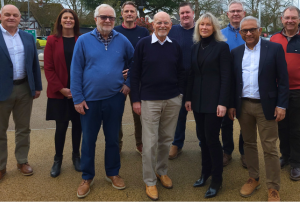Arloid Automation supports the Middle East’s net zero energy strategy 2050 using AI

Arloid Automation is supporting countries across the Middle East to attain net zero emissions. In response to the World Bank’s Gulf Economic Update (GEU – published May 2022), Arloid Automation offers smart energy solutions using artificial intelligence as an important first step to reduce energy use by as much as 30%. In the Update the GEU announced: ‘To keep global warming below 1.5°C this century, the world needs to halve annual greenhouse gas emissions in the next eight years.’ Indeed there is no single solution to solving the problem – it needs a combination of strategies to reduce energy use and a strong push towards green energy alternatives.
To help businesses across the Middle East and North Africa (MENA) region to become more sustainable three partners have been appointed. These are Intech Smart Buildings, operating from Dubai, Riyadh, Doha and Amman, Fixit facilities management operating in Qatar and Doha, and Smart Energy Savings (SES) based in Abu Dhabi.
The Gulf Economic Update sights members of the Gulf Cooperation Council (GCC) as being ‘among the countries with the highest emissions of CO2 per capita in the world’. Clearly this situation cannot continue if global warming is to be kept below 1.5°C this century. By cutting energy consumption carbon emissions are reduced too. And this is something that artificial intelligence (AI) can automatically and proactively work to address. For example, in the real estate sector, building management systems optimised using AI require far less energy to function, resulting in energy savings of up to 30%. Arloid’s AI can prove invaluable with its capability of limiting demand for fossil fuels and reducing operational costs through centralised HVAC connectivity.
Using Deep Reinforcement Learning, the AI learns to automatically manage the operation of HVAC systems in a wide range of buildings via a secure Virtual Private Network (VPN). It then makes decisions based on reinforcement behaviour and real-time data to provide faster optimisation and better HVAC performance. By controlling each HVAC device in the system and dividing the building into distinct heating and cooling micro-zones, arloid.ai provides more nuanced control of the environment and better user comfort. As a result, the technology is achieving up to 30% energy savings across over 56 million square feet. Buildings all over the world from warehouses to retail premises, and from hotels to medical centres, are realising the potential of machine learning to become more sustainable and drive the decarbonisation of the built environment.
The financial barriers to implementing Arloid’s AI technology have been removed due to it being cloud based with no upfront costs. After 60 days the ‘magic’ happens and energy savings start accruing – this means that, in the case of businesses, they can become more competitive due to lower outgoings. As energy costs and living costs in 2022 are rising sharply this is even more beneficial.
AI can quite clearly become a first step in the strategy to address the GCC’s twin challenges of moving to a more sustainable growth model that is less hydrocarbon dependent and manage the transition to a global low-carbon economic environment that could see oil revenues greatly reduced within the next few decades.
With the advent of the United Nation’s 27th Climate Change conference to be held in Egypt, in November 2022 and in the UAE the following year businesses across the region can lead the way towards a sustainable future with smart AI controlled energy management. Why not make it the exemplar region for the rest of the world to follow suit?


